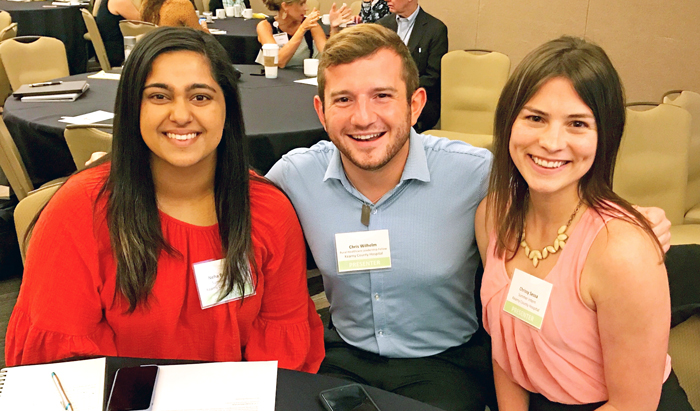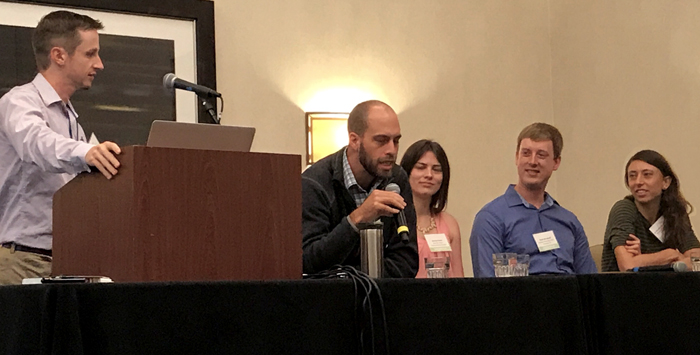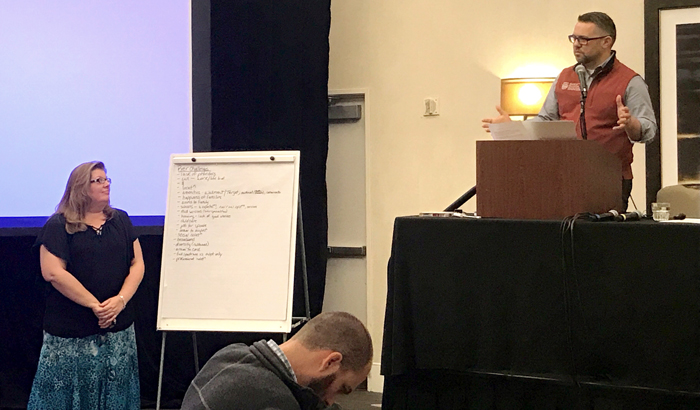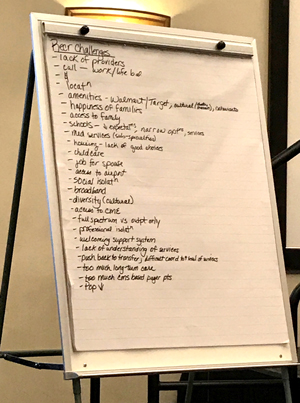Rural Recruitment Reimagined Workshop Presents the "Safe Sites" Model
- Need: Strategies to recruit and retain providers to practice in rural settings.
- Intervention: A traveling one-day workshop was designed to share ideas and firsthand accounts on successful strategies on how to create "Safe Sites" for new recruits.
- Results: So far, workshops have trained over 250 hospital administrators, board members, and rural hospital recruiters.
Description
Recruiting and retaining healthcare providers can be one of the most difficult job requirements of any rural hospital administrator. In southwest Kansas, healthcare partners have discovered essentials to building a "Safe Site" within a hospital and community that not only attracts a new recruit to a rural setting but helps keep them there.
Spearheaded by the University of Kansas Medical Center's Rural Health Education and Services, Via Christi International Family Medicine Fellowship and other healthcare leaders have partnered together to design a traveling one-day workshop that teaches key Safe Site principles to hospital administrators and stakeholders.
Safe Sites
Safe Sites are healthcare facilities that understand and support the motivating factors that drive providers to serve in rural locations. Characteristics of a Safe Site include:
- Administrators who are accessible, humble, and forward-thinking
- Supportive board members
- Mission-driven culture
- Respect for work/life boundaries
- Support of mental health well-being
- Positive organizational culture
- Team-based recruitment
- Stable medical staff
- Compassion for patients
- Opportunity to practice at top of license
- Standardized roles as related to call and procedures
- Equitable call structure
- Fair compensation and generous vacation time
- Opportunity for professional and personal relationships
- Hospitable community
- Strong community engagement

Since its debut in 2018, the Rural Recruitment Reimagined workshop has featured firsthand accounts from the following voices about how to create a Safe Site culture within a rural hospital and community:
- Rural hospital administrators
- Rural practicing providers
- Baylor University interns and fellows
- Via Christi International Family Medicine program directors and fellows
- Via Christi Family Medicine Residency program director, faculty, and residents
- University of Kansas Medical Center students
- University of Kansas Medical Center Rural Health Education and Services representatives
So far, 2 workshops have taken place in Kansas, 1 in Texas, 1 in North Dakota, 1 in Colorado, and 1 in California. Plans are being made in partnership with state rural health organizations to expand the workshop to other states in the future. Registration fees and sponsorships are used to cover travel and boarding for speakers. Workshop fees have been donated to the Via Christi International Family Medicine Fellowship program, which equips providers to serve underserved populations domestically and abroad.

Services offered
Below is a sample of a typical agenda for the Rural Recruitment Reimagined workshop. Sessions are catered to each audience and feature local models.
- Audience Brainstorm Session
- An Introduction to the Mission-Focused Medicine Model
- Panel – Priorities of Millennial Providers
- Organizational Mission Alignment and Perception
- Assessing Organizational Culture
- Community Readiness
- Panel – Becoming Part of a Community
- Key Tool for Attracting Providers to Your Community
- Group Discussion - Lessons Learned and Priorities

Results
- In 2019, a total of 102 stakeholders attended the workshop. Of those attendees, 40 stakeholders who manage rural and underserved healthcare recruitment in other states were in attendance.
- Utilizing this model has helped in the effort of recruiting doctors to western Kansas. From 2015 to 2019, 15 physicians, 5 physician assistants, and 5 nurse practitioners were recruited to southwest Kansas.
- A similar effort has been launched in Colorado, resulting in the successful recruitment of 6 physicians.
- Rural Recruitment Reimagined workshops have fostered partnerships and collaboration among healthcare facilities in recruitment efforts of doctors.
- Norton County Hospital and Clinics hired 3 family medicine providers after applying the principles shared at the workshop in Kansas City. Success stories like this one are becoming more common as the workshop expands to more states.
Challenges

- Commitment — Because the responsibilities of hospital administrators are vast, securing a commitment to attend a workshop can be a tedious or last-minute process.
- Travel — Weather, long distance, and time away from responsibilities may impede administrators and others from attending the workshop.
- Leadership — Not every hospital board and senior administrative team may be ready to become a Safe Site or engage the principles shared at the workshop. The effort requires both self-reflection and a broad vision.
- Community receptivity — Although hospital leadership may want to apply the concepts shared at the workshop, their community may not show interest. In order to successfully become a Safe Site, the two entities need to be in agreement.
Replication
The Rural Recruitment Reimagined workshop can be held in partnership with other healthcare organizations. Below are some considerations before inviting the workshop to your state:
- This workshop works well when offered as part of a larger conference, training, or event. Identify a gathering intended for healthcare leaders who could benefit from the workshop.
- Personal invitations to hospital administrators and follow-up will show your vested interest in the workshop and your belief in its value.
- Hospitals are encouraged to bring a team of
stakeholders, including administration, board members,
and key community leaders, who would be an integral part
in implementing the workshop's principles.
- Consider inviting those who were a part of the last Community Health Needs Assessment process.
- Consider inviting others from the local rural safety net, like mental and public health professionals. Include them in your action planning and implementation process to expand your Safe Site principles across sectors.
- Identify success stories in your own state or region to add a local voice to the workshop's sessions and panels.
Contact Information
Benjamin Anderson, President and CEOHutchinson Regional Healthcare System
CEO@HutchRegional.com
Topics
Hospitals
Recruitment and retention of health professionals
States served
National/Multi-State, Kansas, Texas
Date added
January 13, 2020
Date updated or reviewed
April 23, 2024
Suggested citation: Rural Health Information Hub, 2024. Rural Recruitment Reimagined Workshop Presents the "Safe Sites" Model [online]. Rural Health Information Hub. Available at: https://www.ruralhealthinfo.org/project-examples/1080 [Accessed 27 April 2024]
Please contact the models and innovations contact directly for the most complete and current information about this program. Summaries of models and innovations are provided by RHIhub for your convenience. The programs described are not endorsed by RHIhub or by the Federal Office of Rural Health Policy. Each rural community should consider whether a particular project or approach is a good match for their community’s needs and capacity. While it is sometimes possible to adapt program components to match your resources, keep in mind that changes to the program design may impact results.
